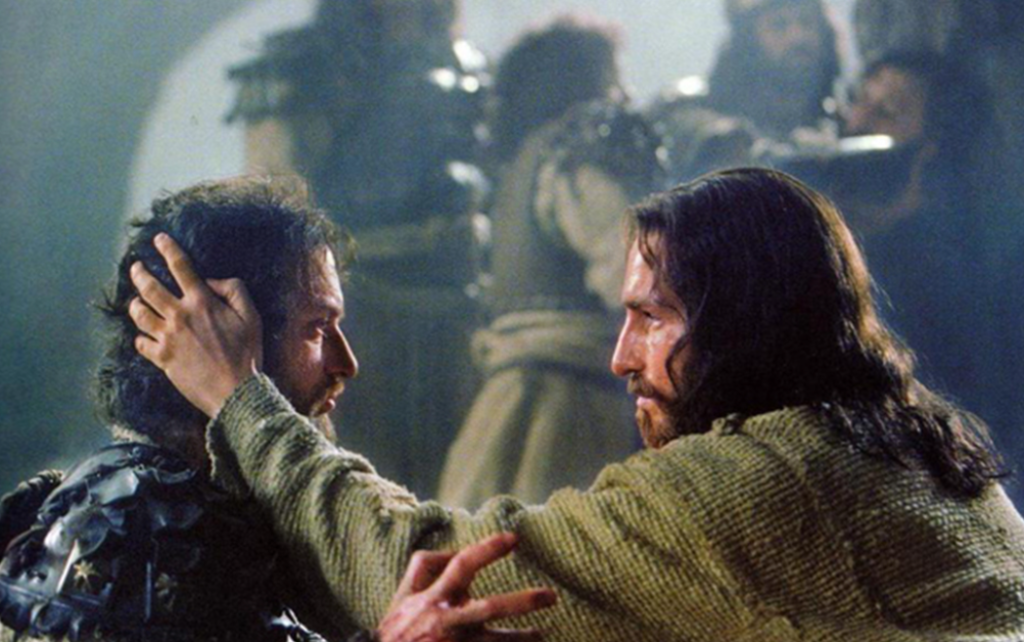
By Brad Hicks
Malchus is a fellow in a Bible story who gets his ear cut off, then Jesus miraculously restores his ear. Here’s how the story went down and a few thoughts about why I’ve named this blogsite Louder For Malchus.
All four gospels in the New Testament record a very brief story of a servant of the high priest in first-century Jerusalem. The servant was a man called Malchus. The high priest at the time was Caiaphas, and Simon Peter, one of Jesus’ disciples, is also prominent in the story. You can read the account in the New Testament in Matthew 26, Mark 14, Luke 22, and John 18.
The story takes place in a garden where Jesus and his disciples are confronted by a large crowd of armed men, possibly soldiers (Malchus being one of them), sent by Jewish religious leaders to arrest Jesus. The arresting party was guided by Jesus’ betrayer, Judas Iscariot.
For centuries, writers, teachers, and scholars have attempted to draw from the story of Malchus many different moral lessons, assumptions, and platitudes, but I call this blogsite Louder For Malchus because his story incites me to wonder …
Immediately following Judas’ infamous kiss of Jesus, a few of the armed men advance to seize Jesus and arrest him (one of them being Malchus). At the same time, one of Jesus’ disciples who has brought a sword lunges toward Malchus and cuts off his right ear. Only the account in John 18 gives a name to both the soldier whose ear was cut off ~ Malchus ~ and to Jesus’ zealous disciple ~ Peter. The other three gospel accounts don’t name names … a factoid which is inconsequential to this particular telling of the story.
What happens next is of supreme consequence, however. During the hubbub of the ensuing struggle, Jesus locates Malchus’ bloody ear, picks it up from the ground, saunters over to Malchus, who, we have to believe, is in a considerable amount of pain, and Jesus seamlessly reattaches the ear to the right side of Malchus’ head, fully healing the wound.
For centuries, writers, teachers, and scholars have attempted to draw from the story of Malchus many different moral lessons, assumptions, and platitudes, but I call this blogsite Louder For Malchus because his story incites me to wonder.
Malchus’ story sends my imagination soaring and raises lots of questions. What might Jesus have said to Malchus while He was healing him? What happened to Malchus after he was healed? What impact did Malchus’ encounter with Jesus have on him? Did he become a follower of Jesus after his healing, or did he simply go back to his normal way of living? Did Malchus thank Jesus? Did he immediately join rank with the arresting party and proceed to participate in Jesus’ arrest, mock trial, and execution? Was he with the angry Jewish crowd yelling “Crucify him!” and “Give us Barabbas!” or did he investigate the claims of Jesus and conclude that “surely this is the Son of God”?
I wonder if Malchus is not unlike me. He probably didn’t immediately drop everything and follow Jesus. His healing encounter with this alleged condemned heretic likely frightened him and caused him to wonder if what had happened to him was a miracle from God or whether it was trickery from a sorcerer or a devilish power from Beelzebub. Malchus, like me, needed followup, teaching in truth, he needed to belong to a community of believers who could help strengthen his faith.
I also wonder if Malchus was left hard of hearing after he was struck by Peter, even though his outer ear was restored; the text doesn’t say that his hearing was or wasn’t restored, or if it was affected at all. All we know for sure is that Malchus tasted the restoration goodness of Jesus and of God’s kingdom come. Maybe Malchus’ life was tethered to Christ on the very day he was healed, that, figuratively speaking, his hearing was forever crystal clear. In all likelihood, however, my Christian faith experience tells me that I and many like me have tasted in our lives that the Lord is good, but that we often need a louder prophetic voice spoken in our ear before we will truly hear. And truly hearing is, consequently, truly believing; and truly believing is obeying the Word we’ve heard.
Our wounds require more assistance in the area where we’re wounded. The hard of hearing require prophets to speak and write graciously and lovingly louder.